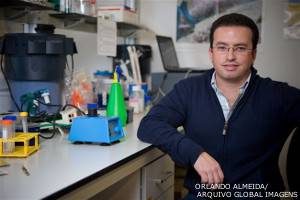
Sandra Tenreiro e Tiago Outeiro, researchers at Chronic Diseases Research Centre of NOVA Medical School/ Faculdade de Ciências Médicas, published an article in "Human Molecular Genetics" that studies a protein that could play a key role in Parkinson's disease.
aSyn is the most studied member of the synuclein family due to its central role in genetic and sporadic forms of Parkinson's disease and other neurodegenerative disorders known as synucleionopathies. In contrast, bSyn and gSyn have been less studied, but recent reports also suggest that, unexpectedly, these proteins may also cause neurotoxicity.
Sandra Tenreiro states that almost 200 years later after Parkinson's disease was found, there's still no cure for it. For Tiago Outeiro, more important than showing that bSyn can exert toxic effects, is the fact that the study enables new questions and reminds us there's still a long way to understand the molecular basis of these type of diseases.
Parkinson's disease affects around 20.000 people in Portugal, and millions around the world. The numbers have increased as a consequence of ageing populations and a cure remains to be found, which entails growing economic and social costs.
Article: Tenreiro S, Rosado-Ramos R, Gerhardt E, Favretto F, Magalhães F, Popova B, Becker S, Zweckstetter M, Braus GH, Outeiro TF. (2015) Yeast reveals similar molecular mechanisms underlying alpha- and beta-synuclein toxicity. Hum Mol Genet. 2015 Nov 18. pii: ddv470. [Epub ahead of print]
Related news (in Portuguese):
Source: http://cedoc.unl.pt/
published 30.December.2015